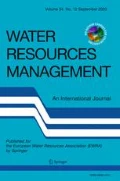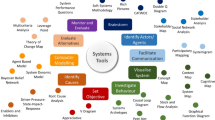Abstract
Over the past decade a series of major revisions to the generation and use of knowledge in the context of natural resources management has started to undermine basic assumptions on which traditional approaches to water management were based. Limits to our ability to predict and control water systems have become evident and both complexity and human dimensions are receiving more prominent consideration. Many voices in science and policy have advocated a paradigm shift in water management—both from a normative (it should happen) and a descriptive (it happens, and how) perspective. This paper summarizes the major arguments that have been put forward to support the need for a paradigm shift and the direction it might take. Evidence from the fields of science, policy, and management is used to demonstrate a lacuna in the translation of political rhetoric into change at the operational level. We subsequently argue that learning processes and critical reflection on innovative management approaches is a central feature of paradigm change and that contributions from psychology which emphasise the roles of frames and mental models can be usefully applied to paradigm change processes. The paper concludes with recommendations to facilitate debate and test alternative approaches to scientific inquiry and water management practice leading to critical reflection and analysis.
Similar content being viewed by others
References
Allan JA (1998) Virtual water: a strategic resource. Global solutions to regional deficits. Groundwater 36(4):545–546
Allan JA (2005) Water in the environment/socio-economic development discourse: sustainability, changing management paradigms and policy responses in a global system. Gov Oppos 40(2):181–199
Allan C, Curtis A (2005) Nipped in the bud: why regional scale adaptive management is not blooming. Environ Manag 36(3):414–425
Barker JA (1992) Paradigms: the business of discovering the future. HarperCollins Publishers, New York
Bergkamp G, Orlando B, Burton I (2003) Change. Adaptation of water resources management to climate change. IUCN, Gland
Biswas AK (2004) Integrated water resources management: a reassessment: a water forum contribution. Water Int 29(2):248–256
Bormann BT, Cunningham PG, Brookes MH, Manning VW, Collopy MW (1993) Adaptive ecosystem management in the Pacific Northwest. USDA Forestry Services General Technical Reprot PNW-GTR-341
Boxer B (2001) Contradictions and challenges in China’s water policy development. Water Int 26(3):335–341
Bradshaw GA, Borchers JG (2000) Uncertainty as information: narrowing the science-policy gap. Conservation Ecology 4(1):7. [online] URL: http://www.consecol.org/vol4/iss1/art7/
Braimoth AK, Craswell ET (2008) Quantitative assessment of interdisciplinarity in water science programs. Water Resour Manage 22:473–484
Bucknall J (2006) Good governance for good water management. In: The World Bank Group (ed) Environment Matters. Annual Review July 2005–June 2006, pp 20–23. Available online: http://siteresources.worldbank.org/INTENVMAT/64199955-1162240805462/21127276/8GoodGovernance.pdf
Cortner HJ, Moote MA (1994) Trends and issues in land and water resources management: setting the agenda for change. Environ Manage 18:167–173
Denzau A, North D (1994) Shared mental models: ideologies and institutions. Kyklos 47:3–31
Dewulf A, Craps DG (2004) How issues get framed and reframed when different communities meet: a multi-level analysis of a collaborative soil conservation initiative in the Ecuadorian Andes. J Community Appl Soc Psychol 14:177–192
Dewulf A, Gray B, Lewicki R, Putnam L, Aarts N, Bouwen R, Van Woerkum C (2009) Disentangling approaches to framing in conflict and negotiation research: a meta-paradigmatic perspective. Hum Relat 69(2):155–194
Doyle JK, Ford DN (1998) Mental models concepts for system dynamics research. Syst Dyn Rev 14:3–29
Galaz V (2005) Does the EC water framework directive build resilience? Harnessing socio-ecological complexity in European water management, Policy paper no. 1. Swedish Water House
Gibbons M, Limoges C, Nowotny H, Schwartzman S, Scott P, Trow M (1994) The new production of knowledge: the dynamics of science and research in contemporary societies. Sage, London
Gigerenzer G (2000) Adaptive thinking: rationality in the real world. Oxford University Press, New York
Gleick PH (2000) The changing water paradigm: a look at twenty-first century water resources development. Water Int 25:127–138
Gray B (2003) Framing of environmental disputes. In: Lewicki R, Gray B, Elliot M (eds) Making sense of intractable environmental conflicts—frames and cases. Island, Covelo, pp 11–34
Gunderson LH, Light SS (2006) Adaptive management and adaptive governance in the Everglades ecosystem. Policy Sci 39:323–334
Gunderson LH, Holling CS, Light SS (1995) Barriers and bridges to the renewal of ecosystems and institution. Columbia University Press, New York
GWP-TEC (Global Water Partnership Technical Advisory Committee) (2000) Integrated water resources management. TAC Background Papers No. 4, GWP, Stockholm, Sweden
Holling CS, Berkes F, Folke C (1998) Science, sustainability and resource management. In: Berkes F, Folke C (eds) Linking social and ecological systems: management practices and social mechanisms for building resilience. Cambridge University Press, Cambridge, pp 342–362
Hollis M, Lukes S (1982) Rationality and relativism. Basil Blackwell, Oxford
Isendahl N (2009) (Re-)Framing uncertainties in water management practice. Doctoral thesis. Institute of Environmental Systems Research, University of Osnabrück (Unpublished)
Jeffrey P, Gearey M (2006) Integrated water resources management: lost on the road from ambition to realisation? Water Sci Technol 53(1):1–8
Johnson BL (1999) The role of adaptive management as an operational approach for resource management agencies. Conservation Ecology 3(2):8. [online] URL: http://www.consecol.org/vol3/iss2/art8/
Jones S (2002) Social constructionism and the environment: through the quagmire. Glob Environ Change 12:247–251
Kincheloe JL (2005) Critical constructivism. Peter Lang Publishing, New York
Kuhn TS (1962) The structure of scientific revolutions. Univ. of Chicago Press, Chicago
Laakkonen S, Laurila S (2007) Changing environments or shifting paradigms? Strategic decision making toward water protection in Helsinki, 1850–2000. Ambio 36(2–3):212–219
Lansing JS (2003) Complex adaptive systems. Annu Rev Anthropol 32:183–204
Larsen TA, Gujer W (1997) The concept of sustainable urban water management. Water Sci Technol 35:3–10
Leclerc M (2005) The ecohydraulics paradigm shift: IAHR enters a New Era. J Hydraul Res 43(4 suppl):63–64
Light S, Blann K (2000) Adaptive management and the kissimmee river restoration project Collaborative Adaptive Management Network, Website address: http://www.iatp.org/AEAM/. Accession Date: 20 April 2004
Mayntz R (1998) New challenges to governance theory, Jean Monet chair papers no. 50, European University Institute.
Medema W, McIntosh BS, Jeffrey PJ (2008) From premise to practice: a critical assessment of integrated water resources management and adaptive management approaches in the water sector. Ecology and Society 13(2):29. [online] URL: http://www.ecologyandsociety.org/vol13/iss2/art29/
Milly PCD, Betancourt J, Falkenmark M, Hirsch RM, Kundzewicz ZW, Lettenmaier DP, Stouffer RJ (2008) Stationarity is dead: whither water management? Science 319:573–574
Odendaal PE (2002) Integrated Water Resources Management (IWRM), with special reference to sustainable Urban Water Management. In: CEMSA 2002 Conference, Johannesburg, South Africa
Odum HT (1983) Systems ecology: an introduction. Wiley, New York
Olsson P, Galaz V (2009) Transitions to adaptive approaches to water management and governance in Sweden. In: Huitema d, Meijerink S (eds) Water policy entrepreneurs: a research companion to water transitions around the globe. Edward Elgar Publishing, Cheltenham UK, pp 304–324
Oreskes N (2004) Science and public policy: what’s proof got to do with it? Environ Sci Policy 7:369–383
Pahl-Wostl C (2002) Towards sustainability in the water sector—the importance of human actors and processes of social learning. Aquat Sci 64:394–411
Pahl-Wostl C (2007a) Transition towards adaptive management of water facing climate and global change. Water Resour Manag 21(1):49–62
Pahl-Wostl C (2007b) The implications of complexity for integrated resources management. Environ Model Softw 22:561–569
Pahl-Wostl C, Craps M, Dewulf A, Mostert E, Tabara D, Taillieu T (2007) Social learning and water resources management. Ecology and Society 12(2):5. URL: http://www.ecologyandsociety.org/vol12/iss2/art5/
Pinkham R (2002) 21st century water systems: scenarios, visions, and drivers. RMI working paper, see: http://www.rmi.org/images/other/W-21CentWaterSys.pdf
Pollard S, du Toit D (2009) Integrated water resource management in complex systems: how the catchment management strategies seek to achieve sustainability and equity in water resources in South Africa. Water SA 34(6):671–680
Prato A (2003) Adaptive management of large rivers with special reference to the Missouri River. J Am Water Resour Assoc 39(4):935–946
Republic of South Africa (1998) National Water Act. Act No 36 of 1998. Government Printer, Pretoria
Sarewitz D (2004) How science makes environmental controversies worse. Environ Sci Policy 7:385–403
Schön DA, Rein M (1994) Frame reflection—toward the resolution of intractable policy controversies, Basic Books
Sendzimir J, Magnuszewski P, Flachner Z, Balogh P, Molnar G, Sarvari A, Nagy Z (2007) Assessing the resilience of a river management regime: informal learning in a shadow network in the Tisza River Basin. Ecology and Society 13(1):11. [online] URL: http://www.ecologyandsociety.org/vol13/iss1/art11/
Shea K, the NCEAS Working Group on Population Management (1998) Management of populations in conservation, harvesting, and control. Trends Ecol Evol 13:371–375
Sontag ED (1998) Mathematical control theory: deterministic finite dimensional systems, 2nd edn. Springer, New York, 531+xvi pages
Termeer CJAM, Koppenjan JFM (1997) Managing perceptions in networks. In: Kickert WJM, Klein E-H, Koppenjan JFM (eds) Managing complex networks—strategies for the public sector. Sage Publications, pp 79–97
Turton AR (1999) Water scarcity and social adaptive capacity: towards an understanding of the social dynamics of water demand management in developing countries. Occasional paper no. 9. Water Issues Study Group, SOAS, University of London
U.S. Army Corps of Engineers (2004) Water resources planning: a new opportunity for service. Coordinating Committee, Committee to Assess the U.S. Army Corps of Engineers Methods of Analysis and Peer Review for Water Resources Project Planning, National Research Council (USA)
V&W (1996) Ministry of Transport and Public Works. Ruimte voor de Rivier (Room for the River). Staatscourant 77:9
von Bertalanffy L (1968) General system theory. Foundations, development, applications. George Braziller, New York
Walters C (1997) Challenges in adaptive management of riperian and coastal ecosystems. Conservation Ecology 1(2):1. http://www.consecol.org/vol1/iss2/art1
Walters CJ, Hilborn R (1978) Ecological optimization and adaptive management. Annu Rev Ecol Syst 9:157–188
Ward RC (1995) Integrated watershed management; a new paradigm for water management? Journal of Contemporary Water Research and Education 100:2
Wardekker JA, van der Sluijs JP, Janssen PHM, Kloprogge P, Petersen AC (2008) Uncertainty communication in environmental assessments: views from the Dutch science–policy interface. Environ Sci Policy 11:627–641
Author information
Authors and Affiliations
Corresponding authors
Rights and permissions
About this article
Cite this article
Pahl-Wostl, C., Jeffrey, P., Isendahl, N. et al. Maturing the New Water Management Paradigm: Progressing from Aspiration to Practice. Water Resour Manage 25, 837–856 (2011). https://doi.org/10.1007/s11269-010-9729-2
Received:
Accepted:
Published:
Issue Date:
DOI: https://doi.org/10.1007/s11269-010-9729-2




